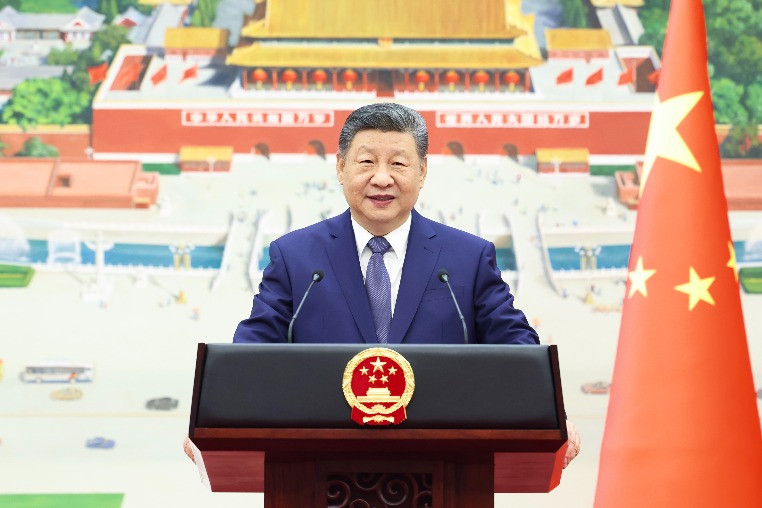Keeping the genie bottled


China and the US should build sustainable regular dialogue mechanisms and strive to forge a consensus on AI cooperation
China and the United States had an in-depth, professional and constructive exchange of views on the governance and risks of artificial intelligence technology at the first intergovernmental dialogue between the two countries on AI held in Geneva, Switzerland, on May 14.The meeting was aimed at implementing the consensus reached by the two heads of state in San Francisco in November, and was a key measure to maintain communication and control risks.
A comparison between the two states' approach to AI governance reveals divergences between them in the focus of application and perception of risks.
Regarding application, the US attaches great importance to AI's use in fields such as the military and cybersecurity. In social application scenarios, AI is also used in the country's healthcare, information technology and manufacturing sectors.
While advancing the development of AI, the US has not lost sight of the risks associated with the emerging technology. The US National AI Advisory Committee has listed the misuse and abuse of AI, disruptions to economy and society, interventions in the democratic process, and uncontrollable weapons as the main risks and challenges.
In October 2022, the Joe Biden administration issued the Blueprint for an AI Bill of Rights, which laid out the principles of safe and secure AI systems, algorithmic discrimination protections, data privacy, and notice and explanation. In January 2023, the National Institute of Standards and Technology developed the AI Risk Management Framework, outlining the characteristics of trustworthy AI systems, which include being valid and reliable, secure, accountable and transparent, explainable, privacy enhanced, and fair with their harmful biases managed.
By comparison, China places more importance on AI's role in promoting socioeconomic development, and is cautious about its military use.
In 2017, China issued a development plan for new-generation AI, underscoring its potential to become a new economic engine, and a tool to improve livelihoods. As part of efforts to boost industrial innovation and develop new quality productive forces at a faster pace, China announced the launch of the AI Plus initiative at this year's government work report.
At the Global AI Governance Initiative unveiled in 2023, China called for major countries to be cautious about the development and application of AI for military uses.
As for the risks, China stressed the importance of safeguarding national security and social stability in the era of AI.
At the national level, AI has the potential to serve as a shield for national security; however, it also carries the risk of being weaponized in information warfare, potentially resulting in the leakage of national intelligence. At the societal level, AI may cause data leaks of enterprises or dissemination of false or harmful information, threatening people's health, information safety, and intellectual property rights.
Meanwhile, China and the US face multiple challenges in AI governance cooperation.
First, in the context of the US' strategic competition against China, the Biden administration is building "small yards with high fences" to suppress China's tech progress. AI is a key area of US' suppression against China, and its export controls on AI technology will not be loosened in the short term.
Second, the US is building a tech alliance against China, and trying to gain the high moral ground by touting "differences in values". In its National Security Strategy released in 2022, the Biden administration said the US will work in lockstep with its allies to compete against China. US Secretary of State Antony Blinken admitted that the US' zero-sum competition with China will force countries to pick sides between the two nations, and said that the US will not loosen its tech restrictions on China.
Third, as AI technology develops fast across the world, regulation and governance of the sector lags behind. AI technology may bring challenges and risks in different application scenarios, making it difficult for one country to work out an in-time and comprehensive regulatory approach.
Looking forward, China and the US enhancing their dialogue on AI will not only help stabilize bilateral ties, but also set a good example for global AI governance.
Therefore, the two countries should explore the direction of cooperation in the next stage with the recent summit as a starting point, promote more dialogues at the global level, and encourage communication on AI issues at multiple levels, through various channels, engaging diverse stakeholders. It is suggested the two sides first pilot small-scale cooperation in areas of common concern.
Given the implications of the US presidential election, China and the US should build sustainable regular mechanisms of dialogue and strive to forge consensus between the two parties on AI cooperation with China. At the same time, the two countries could learn risk control experiences from other areas, and explore building risk assessment and management teams to avoid uncontrollable risks.
In addition, China and the US should further promote cooperation in areas where the two sides have reached consensus, including climate governance, narcotics control, cross-border crime monitoring, and remote medical care. The two countries could consider including AI governance into their existing dialogue mechanisms, and strengthen interactions between the two working teams on different issues, thereby expanding consensus on AI governance, and paving the way for further dialogue and cooperation.
Sun Chenghao is a fellow and head of the US-Europe Program at the Center for International Security and Strategy at Tsinghua University. Zhang Xueyu is an assistant fellow of the US-Europe Program at the Center for International Security and Strategy at Tsinghua University. The authors contributed this article to China Watch, a think tank powered by China Daily.The views do not necessarily reflect those of China Daily.
Contact the editor at editor@chinawatch.cn.


































